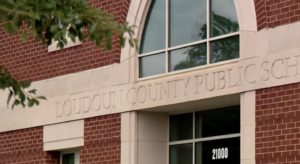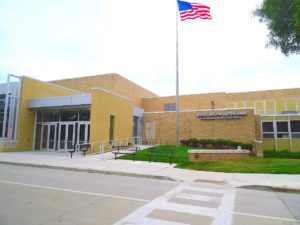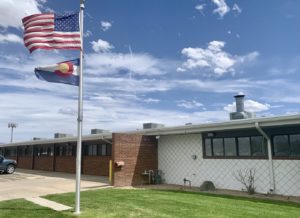An ‘activist organization,’ not a school: Father files $3 million lawsuit alleging discrimination against heterosexuals, cisgendered in Denver Public Schools
Claiming his young sons are inundated with “LGBTQIA+” pride flags at school but can’t respond in kind, a father is suing a Colorado school district claiming the practice discriminates against…

Claiming his young sons are inundated with “LGBTQIA+” pride flags at school but can’t respond in kind, a father is suing a Colorado school district claiming the practice discriminates against heterosexual and cisgendered students.
“Frankly, the only thing Denver Public Schools cares about is furthering its insatiable appetite to rise in the ranks of activist entities that push a single-sided narrative–and Denver Public Schools is using children to do so,” the lawsuit states.
Father of two Nathan Feldman filed the lawsuit Nov. 10 against Denver Public Schools, DPS Board of Education, the Slavens School and key officials. The lawsuit accuses the district of “the unlawful governmental restriction of student speech” and the “unlawful governmental discrimination on the basis of viewpoint” and the “basis of sex.”
The lawsuit points to DPS’s 2020 policy, titled “Resolution on Inclusion for Our LGBTQIA+ Employees, Students and Community Members,” which allows the display of pride symbols.
The policy states “the District supports the right of its employees to post in their classrooms, offices, or halls a rainbow flag or other sign of support for LGBTQIA+ students or staff, because there are symbols consistent with the District’s equity-based curriculum.”
Feldman claims his 8-year-old sons, referred to as O.F. and N.F., are exposed to “dozens if not hundreds” of pride flags daily due to the district’s policy.
Despite Feldman’s request for a flag representing his children’s heterosexual views alongside pride flags, district officials refused, citing the policy.

“DPS doesn’t allow for other flags,” Principal Kurt Siebold stated, according to the lawsuit.
The lawsuit condemns the district’s decision, claiming it violates the First and 14th amendments.
“The district’s decision to speak and express its favored view on the topic of sex while contemporaneously prohibiting any other viewpoint on the same topic from being spoken about or expressed in a similar or identical manner epitomizes the very governmental restriction of speech the First and Fourteenth Amendments prohibit,” the lawsuit states.
Constitutional law attorney Megan Bishop told a Denver television station the pride flag’s presence doesn’t exclude others.
“There isn’t anything particularly about the pride flag that excludes or causes disparate treatment of people who don’t consider themselves part of the queer community,” Bishop said. “They’re already included. They’re not being marginalized by not having a ‘straight pride’ flag up there.
“Here, what the plaintiffs are trying to do is force a recognized government entity to engage in speech, when actually, the reality of the situation is, when it is a government entity, they’re allowed to pick the messages they want to convey as a public message.”
However, that’s actually not the case.
The Supreme Court ruled last year in Shurtleff v. City of Boston that the city violated the Constitution when it refused a request to fly a Christian flag in front of city hall – after it had flown the flags of such organizations as an LGBTQ group and the National Juneteenth Observance Foundation.
Boston had argued it “reserved the pole to fly flags that communicate governmental messages” and was “free to choose the flags it flies without the constraints of the First Amendment’s Free Speech Clause,” according to Vermont League of Cities and Towns. A city official also argued that flying the Christian flag would violate the Establishment Clause of the First Amendment, which says “Congress shall make no law respecting an establishment of religion.”
But the high court ruled that not flying the Christian flag after flying other organizations’ flags was, in fact, the constitutional violation.
Justice Brett Kavanaugh noted, as described by SCOTUSblog, that the high court “has made clear that the government does not violate the Constitution when it puts religious people and speech on an equal footing with their secular counterparts. To the contrary, Kavanaugh stressed, ‘a government may not treat religious persons, religious organizations, or religious speech as second-class.’”
Feldman’s attorneys argue the same in the Denver case.
“As a public entity tasked with educating children, it is of the upmost importance that it adheres to the Constitution(‘s) guarantees of free speech and expression,” the lawsuit states. “DPS is fully aware, and it knows that its policy is unlawful, that it has violated Plaintiffs rights, and by continuing to deprive Plaintiffs of their rights to free speech and expression, DPS is intentionally, knowingly, willfully, purposefully, and maliciously engaging in patent viewpoint discrimination.
“Yet it does not care, and that is because Denver Public Schools has convinced itself that it is not an educational system but instead, an activist organization, as made clear in the very same policy mentioned above.”
Feldman’s lawsuit seeks $3 million, asserting his children suffered irreparable harm by being denied their First and 14th amendment rights and being discriminated against based on their viewpoints.



